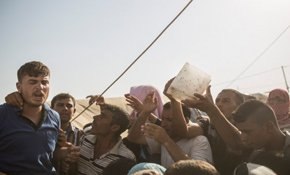John Humphrys asks: should Britain use force in Iraq?
The desperate plight of thousands of Yazidi refugees trapped without food, water or shelter in the sweltering heat on Mount Sinjar in northern Iraq has appalled the world. An international humanitarian relief effort has been mounted to rescue them and David Cameron has committed Britain to playing its part. But the Yazidis’ dreadful predicament is not the result of a natural disaster. It is the consequence of vicious persecution by a brutal, militant Islamic fighting force that has swept through north-east Syria and much of Iraq and has declared what amounts to a new terrorist state in the region. Should the West in general, and Britain in particular, resort to arms to defeat it?
Quite what the extent of the immediate humanitarian catastrophe on Mount Sinjar is remains unclear. Initially it was thought that tens of thousands of Yazidis and other religious minorities had fled there to escape the onslaught of what until recently had been called the Islamic State of Syria and the Levant but which is now known simply as the ‘Islamic State (IS). But on Wednesday night, following an air reconnaissance exercise, the US Defence Department reported that there were ‘far fewer’ stranded refugees than had been thought and that they were in better condition than had been feared.
This less dire news may have been the consequence of the fact that many of those affected had been able to make use of a safe corridor off the mountain down into Syria and back into Iraq. Nonetheless, the international community including Britain is still dropping emergency aid on to the mountain and still faces the task of rescuing those unfit enough to make the descent of the mountain on foot.
Even if all the fleeing Yazidis are saved from the extreme conditions of Mount Sinjar there will still be a massive refugee problem to face. Around 1.2 million Iraqis have been displaced as a result of the Islamic State’s military action. The United Nations has defined their plight as a ‘level three emergency’, the most severe category, and the Kurdistan region of northern Iraq is already overwhelmed by their presence.
It is one thing, though, for the international community to organise humanitarian assistance for refugees; quite another to decide what to do about those responsible for the violence that has caused their suffering.
The speed of the Islamic State’s advance over the last six months has astonished the world. IS, a militant Sunni group, is an offshoot of al-Qaeda in Iraq, which sprang up after the American and British invasion of the country in 2003. During its military occupation of the country the Americans were able to turn moderate Sunnis against al-Qaeda by offering to create a political system in Iraq in which the minority Sunnis would share power with the majority Shia and also the Kurds in the north. As a result, al-Qaeda in Iraq was defeated and driven out, largely into neighbouring Syria.
The Syrian civil war gave them their next opportunity and in alliance with other forces fighting against the regime of Bashir al-Assad they made territorial gains, especially in the north-east on the border with Iraq. What gave them their chance again in Iraq was the failure of the supposedly power-sharing government in Baghdad to respect the interests of the Sunni minority in the country. The government of prime minister Maliki proved itself deeply partisan to his own Shia population, notwithstanding constant pressure from the Americans to govern for the whole country.
As a result, IS, the ‘child’ of al-Qaeda in Iraq, was largely welcomed by the oppressed Sunni of western Iraq when they re-entered the country. In December last year they took the Sunni cities of Falluja and Ramadi and in June they captured Iraq’s second largest city, Mosul.
In the face of this onslaught the American-trained, largely Shia Iraqi Army collapsed and IS captured large quantities of American-supplied weaponry from them. It now controls nearly a third of the country. For a time it was thought intent on trying to take Baghdad itself but instead it set its sights on oil-rich Kurdistan in the north and is now only 25 miles from the Kurdish capital, Irbil.
IS’s fighting force is not only now well-equipped, but it is also efficient, disciplined and very brutal. It has taken to boasting about and showing evidence of its atrocities on social media. These include not only the mass shooting of enemy captives but also beheadings, crucifixions and rape. It was to escape such a fate that the Yazidis (an ancient religious group which, despite its reverence for both Islam and Christianity, is regarded as Satanic by IS) fled to Mount Sinjar.
On 29 June IS declared a new caliphate stretching, so far, from Aleppo in Syria to the eastern provinces of Iraq. What the ambition is for the ultimate reach of this caliphate remains unknown but the distinguished Middle East journalist, Patrick Cockburn, was clear what had already happened: ‘a new and terrifying state has been born’.
Few in the west look on this development with anything other than horror. The question is: what should be done about it? Last week President Obama authorised US air strikes on the advancing IS forces in Kurdistan and several have already been carried out. The Americans are also supplying arms to the Kurdish peshmerga forces fighting against IS and France has said it will do the same.
Britain, however, has yet to follow suit. Perhaps as a result of the bloody nose he got last year when the House of Commons voted against his plan to intervene militarily in the Syrian civil war, David Cameron has so far held back. But he is under pressure to join in the military response to IS. His former defence secretary, Liam Fox, said of IS on Wednesday: ‘They are our enemy; they will have to be defeated’. He advocated either providing arms to the peshmerga or joining the Americans in air assaults on IS forces, or both. Britain has already sent Tornado aircraft to the region, ostensibly to aid in reconnaissance exercises, but their function could be switched to ground attack.
But there is scepticism about whether either of these military options could be successful. The problem with air attacks is twofold. Firstly, although advancing IS forces can be attacked on open ground, their real strength lies in the cities they hold, and air attacks on them would risk massive civilian casualties that would alienate feeling both there and back here. Furthermore, it’s feared the IS has the capacity to shoot down aircraft, leading to the possibility of them capturing western air crew and holding them as hostage. Given their willingness to treat such hostages barbarously, the impact on public opinion here could be overwhelming.
Equally there is no guarantee that arming the peshmerga would lead to the defeat of the IS. If, instead, IS were victorious, then the issue of whether western (and therefore British) troops should return to Iraq would once again be on the agenda. The fear of mission creep is bound to be at the back of the minds of Barak Obama and David Cameron.
Those against going beyond purely humanitarian assistance make several points. First, they say we should not be dazzled by IS’s success so far. Those successes, they argue, have been due to their fighting in largely Sunni areas of Iraq where they have been welcomed. But they will face much greater opposition if they persist in their campaign in Kurdistan or turn their sights on largely Shia Baghdad. Furthermore, moderate Sunnis in areas they have taken may once again turn on them, as soon as they have a more amenable government in Baghdad.
Secondly they insist that western intervention only makes things worse. That, they claim, is the lesson of the US invasion of 2003. Furthermore, they argue that there is a very real danger that if we resume fighting in a Muslim country, we shall simply breed a new generation of British-born militant Islamists ready to bring the fight on to the streets of Britain. Such ‘blowback’ must be avoided at all costs.
Some argue too that the current problem is simply the consequence of the much earlier western intervention after the First World War, when Britain and France carved up the Arabic parts of the disintegrating Ottoman Empire, to create the artificial countries of Syria and Iraq, regardless of the existence of the different religious groups on the ground. The inevitable result was the dictatorships of the Assad family in Syria and of Saddam Hussein in Iraq, necessary to keep the countries together. Those ‘fake’ countries are now bound to break up and we should simply let the inevitable take its course.
That seems to be what IS wants too. The question is whether we can face a ‘new and terrifying state’ being born in the Middle East or, if not, what we are prepared to do about it.










